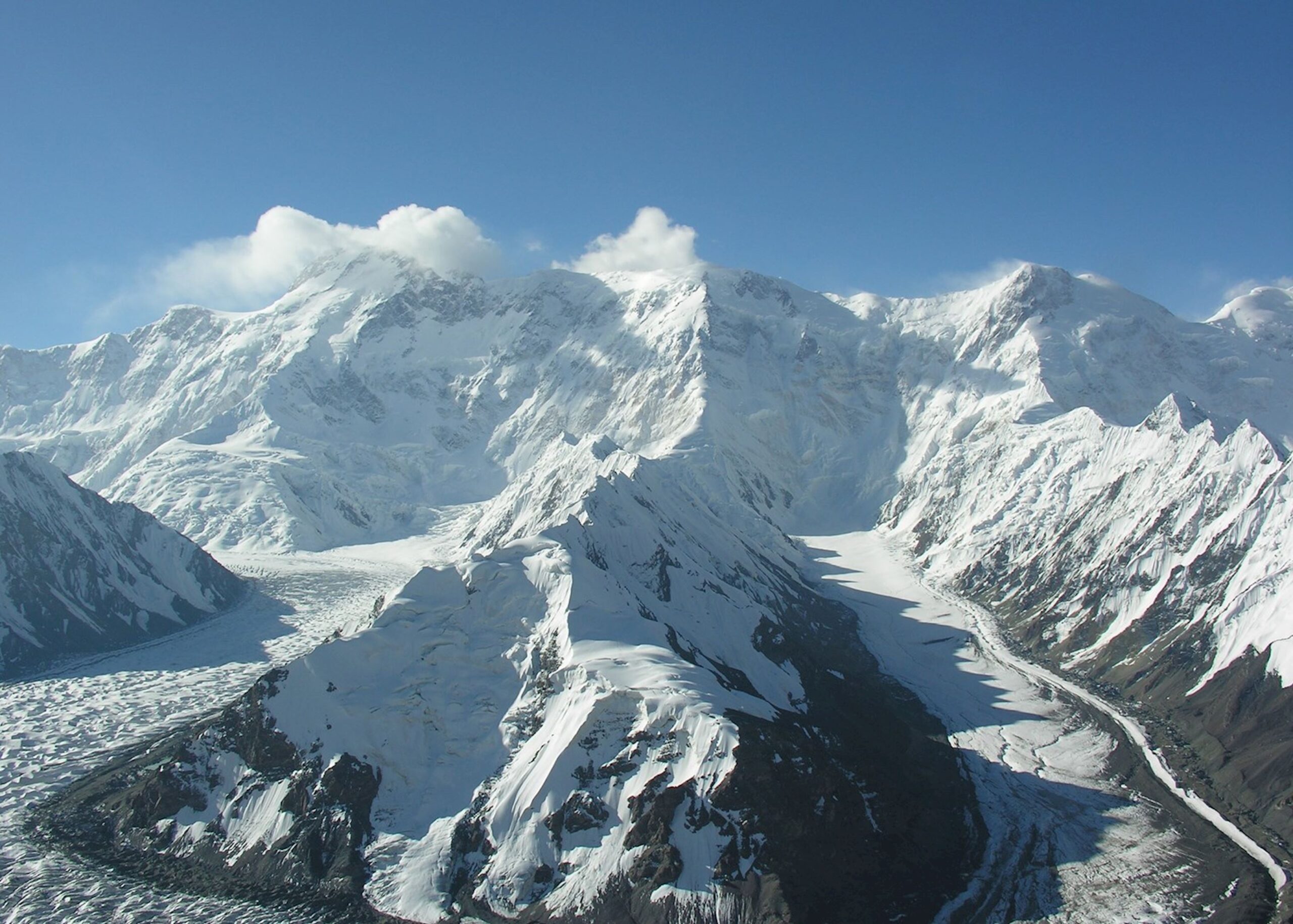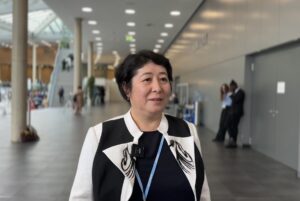BONN—The Kyrgyz President’s Special Representative for mountainous regions revealed how melting glaciers in the Kyrgyz Republic are affecting the population of the whole Central Asian region at the June United Nations (UN) Climate Meetings on June 3-13 in Bonn, Germany.

The very roof of Central Asia, the Inylchek Glacier, straddling the borders of Kyrgyzstan, Kazakhstan and China. Photo credit: audleytravel.com
The link between climate change and melting glaciers is becoming ever more visible. Dinara Kemelova, Kyrgyz President’s Special Representative for implementation of the five years of action for the development of mountain regions, urges the world to pick up the pace on climate action as glaciers continue to melt.
The Central Asian region is vulnerable to glacier melt
The hardest hit are the most vulnerable people of the mountainous regions, which have done little to contribute to the fossil fuel emissions that drive up temperatures, according to Kemelova.

Dinara Kemelova, Kyrgyz President’s Special Representative for mountainous regions. Photo credit: The Astana Times
“We are now talking about the fact that people in mountainous regions are the most vulnerable to climate change. The biggest problem is, of course, the melting of glaciers. Regardless of the region, whether it’s Europe, Latin America, North America, Asia, Africa, everywhere countries are experiencing glacial melt,” she said.
The Central Asian region depends on meltwater from Kyrgyz glaciers for drinking water and irrigation.
“Coming from a Central Asian perspective, we realize our mountain resources, particularly the glaciers, are crucial sources of fresh water for the people of the entire region. If we fail to preserve the glaciers today and the current trend continues, we could face a severe water crisis within a few decades. This is very much the worst-case scenario,” said Kemelova.
In extreme cases, countries lose glaciers completely.
“A dialogue with experts revealed that two countries have already lost their glaciers. We are talking about Slovenia in Europe and Venezuela in Latin America. They say that they practically have no glacier left,” said Kemelova.
“I met with a representative from Venezuela who shared how they had made various attempts to preserve their glaciers. They even covered them with cloth, but they did not succeed in preserving the glaciers. This means we cannot preserve our own glaciers alone, so we need more decisive actions by all parties to mitigate climate change,” she added.
The UN General Assembly declared 2022 the international year of sustainable mountain development, at the proposal of the Kyrgyz Republic. Since then, the country has also announced a five-year action plan on sustainable development of mountain regions for 2023-2027.
“As part of this action plan, we are now actively promoting the mountain agenda on various platforms, including the UN Framework Convention on Climate Change and other UN agencies,” said Kemelova.
Kyrgyzstan is home to over 88 major mountain ranges, most of which form the Tian Shan—the Celestial Mountains. The others, such as the Chon Alai Range in the south of the country, belong to the Pamir Mountains.
“Kyrgyzstan is a country where 94% of the territory is occupied by mountains. This means we should pay 94% of our attention to the mountains,” said Kemelova.
“We are also saying that mountain ecosystems don’t just support mountainous nations, but they are vital for downstream countries, too. We should not think in terms of separate problems for mountain and non-mountain countries —we’re all interconnected and reliant on these ecosystems,” she added.
Following a resolution initiated by Tajikistan and supported by many countries, the UN General Assembly announced 2025 to be the International Year of Glacier Preservation.
Negative consequences of glacier melt
The Kyrgyz Republic and the Central Asian region as a whole could face multiple climate hazards, such as loss of biodiversity, flooding, land degradation and drought, exposing communities to unpredictable and costly disasters.
“We are talking about the loss of biodiversity in mountainous areas, such as the snow leopard. You have probably all heard that the snow leopard and other species of flora and fauna are endangered,” said Kemelova.
“We are also talking about the degradation of pastures in mountainous regions. The fact that many mountains are already losing their forest surface, almost no grass can grow. In our countries, for example, especially in mountainous countries, people are used to cattle breeding. And this is very critical because there is not enough fodder to keep livestock, to keep cattle,” she added.
This is coupled with mudslides, leashes, and avalanches, which destroy houses and leave people without access to essential resources like clean water, sanitation, and energy.
According to Kemelova, even if global warming is limited to 1.5 degrees Celsius, it might not be enough for the glaciers to keep their volume, so 1.1- 1.2 degrees is more advisable.
International and regional agenda
Within the June UN Climate Meetings in Bonn and the 29th Conference of Parties (COP29) in Azerbaijan, Kemelova said they are committed to continuing cooperation and dialogue.
“Now one of our two main goals is to make this expert dialogue on mountains and climate regular, so that every year we meet, discuss problems, share experience, and exchange some new technologies,” said Kemelova.
“The second goal is that we want to create a mountain partnership group within the UNFCCC (UN Framework Convention on Climate Change). This group will unite countries, whether mountainous or those interested in preserving mountain ecosystems, to form a strong, unified voice. Together, we aim to call on the global community to address the challenges faced by mountain ecosystems and the people who depend on them,” she added.
The good news is that the Central Asian region is cooperating, with Uzbekistan soon joining the mountain partnership negotiating group.
“We are very actively cooperating with Kazakhstan and Uzbekistan. We can announce that Uzbekistan has decided to join the mountain partnership group within the framework of the UNFCCC. We expect that Kazakhstan will also decide to join the group of mountain countries in the near future,” said Kemelova.
Kemellova’s conclusion is that dealing with glacier melt requires not only regional but global cooperation, as it is a crisis that will have global consequences.
